Stress is an inevitable part of life, but when it becomes chronic, it can wreak havoc on your health—especially your weight. The hormone cortisol, often called the “stress hormone,” plays a significant role in weight gain and fat storage. In this article, we’ll explore the connection between cortisol and weight gain, how stress impacts your body, and practical strategies to reduce stress for effective fat loss.
What is Cortisol and How Does It Affect Weight?
Cortisol is a hormone produced by the adrenal glands in response to stress. While it’s essential for survival (helping you respond to immediate threats), chronically elevated cortisol levels can lead to:
1. Increased Appetite
- Cortisol triggers cravings for high-calorie, sugary, and fatty foods, leading to overeating.
2. Fat Storage
- High cortisol levels promote fat storage, particularly in the abdominal area.
3. Slowed Metabolism
- Chronic stress can slow your metabolism, making it harder to burn calories.
4. Muscle Breakdown
- Cortisol can break down muscle tissue for energy, reducing your metabolic rate.
How Stress Leads to Weight Gain
1. Emotional Eating
- Stress often leads to emotional eating, where you consume comfort foods high in sugar and fat.
2. Disrupted Sleep
- Stress can interfere with sleep, which disrupts hormones that regulate hunger and metabolism.
3. Reduced Physical Activity
- When stressed, you may feel too tired or unmotivated to exercise.
4. Hormonal Imbalance
- Chronic stress disrupts the balance of hormones like insulin, leptin, and ghrelin, which regulate appetite and fat storage.
How to Reduce Cortisol Levels for Fat Loss
1. Practice Stress Management Techniques
- Meditation: Spend 10-15 minutes daily practicing mindfulness or guided meditation.
- Deep Breathing: Try techniques like box breathing (inhale for 4 seconds, hold for 4 seconds, exhale for 4 seconds, hold for 4 seconds).
- Yoga: Combines physical movement with mindfulness to reduce stress.
2. Prioritize Sleep
- Aim for 7-9 hours of quality sleep each night.
- Create a bedtime routine to wind down, such as reading or taking a warm bath.
3. Exercise Regularly
- Engage in moderate exercise like walking, swimming, or cycling to reduce cortisol levels.
- Avoid overtraining, as excessive exercise can increase cortisol.
4. Eat a Balanced Diet
- Focus on whole, nutrient-dense foods like fruits, vegetables, lean proteins, and healthy fats.
- Avoid sugary, processed foods that can spike cortisol and lead to weight gain.
5. Stay Hydrated
- Dehydration can increase cortisol levels. Drink plenty of water throughout the day.
6. Limit Caffeine and Alcohol
- Both can increase cortisol levels and disrupt sleep.
7. Connect with Others
- Social support can help reduce stress. Spend time with friends and family or join a support group.
Foods That Help Lower Cortisol
1. Omega-3 Fatty Acids
- Found in fatty fish (salmon, mackerel), walnuts, and flaxseeds.
2. Magnesium-Rich Foods
- Leafy greens, nuts, seeds, and whole grains.
3. Vitamin C-Rich Foods
- Citrus fruits, bell peppers, and strawberries.
4. Probiotics
- Yogurt, kefir, sauerkraut, and other fermented foods support gut health, which is linked to stress reduction.
5. Complex Carbs
- Oats, quinoa, and sweet potatoes help stabilize blood sugar and reduce cortisol.
The Role of Cortisol in Long-Term Weight Management
Managing cortisol levels isn’t just about short-term stress relief—it’s about creating a lifestyle that supports hormonal balance and overall health. By reducing stress, you can improve your metabolism, control cravings, and maintain a healthy weight long-term.
The connection between cortisol and weight gain highlights the importance of managing stress for effective fat loss. By incorporating stress-reducing techniques, prioritizing sleep, eating a balanced diet, and staying active, you can lower cortisol levels and achieve your weight loss goals.
Start by identifying your stress triggers and implementing small, consistent changes to your daily routine. With time and effort, you can reduce stress, balance your hormones, and enjoy a healthier, leaner body.



